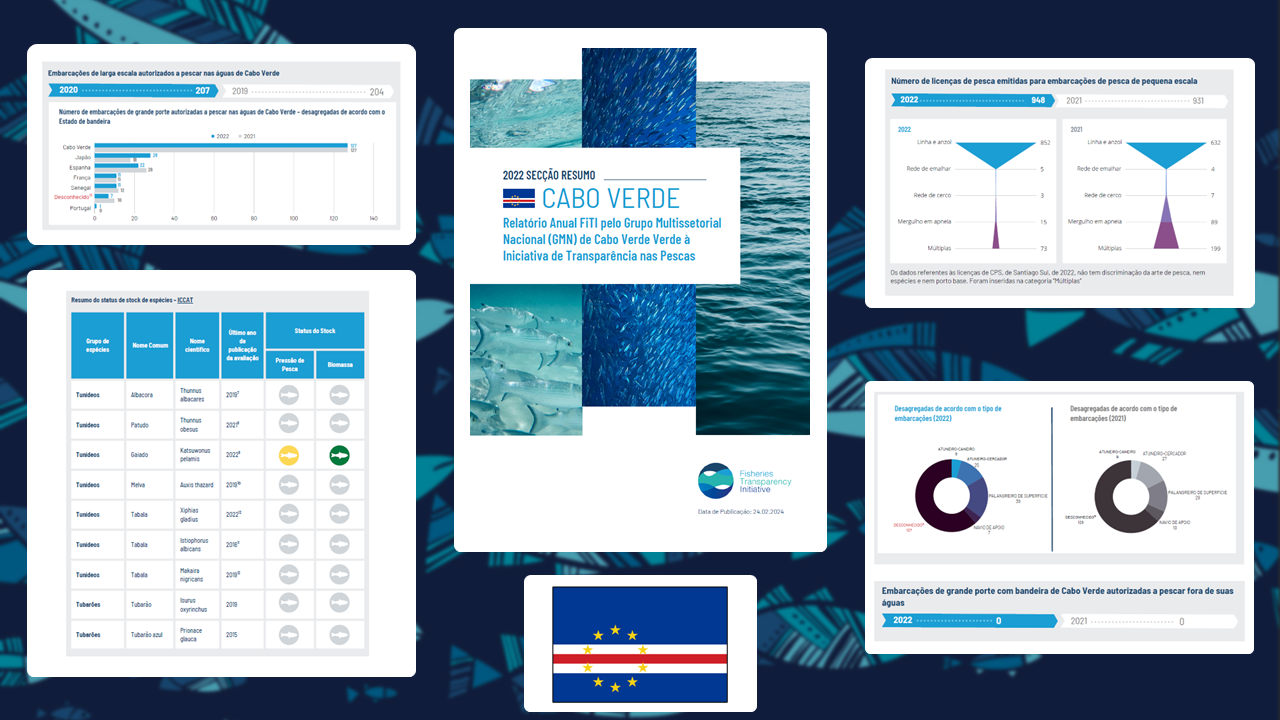Cabo Verde publishes first FiTI Report, prioritizing a transparent fisheries sector

PRAIA – Cabo Verde‘s Multi-stakeholder Group (MSG) has taken a critical step towards fisheries transparency this week, publishing their first FiTI Report and re-emphasising their commitment to improving governance within the marine fisheries sector. Although this new report provides public access to a range of previously unpublished information, it also highlights a diversity of challenges.
Approved by the Cabo Verde’s FiTI National MSG at the end of December 2023, and published on March 5, 2024, the 2022 FiTI Report comes a year after Cabo Verde became the fifth country worldwide to achieve FiTI Candidate Country status, representing the momentum that transparency in fisheries management is gaining around the world.
Cabo Verde’s first FiTI Report assesses the availability, accessibility and completeness of data from six of twelve thematic areas outlined by the FiTI Standard. These areas comprise essential aspects of transparency in fisheries management, including laws, tenure arrangements, fishing access agreements, and information from Cabo Verde’s large-scale and small-scale fisheries, including vessel information, licences, and catch data.
Providing access to accurate, reliable fisheries data is more than just an interesting exercise for countries like Cabo Verde; improving the transparency and accessibility of this information can foster accountability, encourage informed public discourse, and catalyse participation and effective decision-making in fisheries management. By supporting stakeholder engagement through their National MSG – and working to supplement government fisheries data – Cabo Verde is prioritizing a comprehensive approach to marine fisheries governance.
With the publication of this report, a considerable amount of information is now publicly accessible, including a listing of foreign fishing agreements, information for industrial and semi-industrial fishing vessels (such as type of vessels and their flag State), payment information for granting industrial vessels fishing access to Cabo Verde’s waters, semi-industrial catch information, and basic information on artisanal fishing in Cabo Verde (based on its most recent, Five Year Census 2021).
However, the report clearly illustrates several important categories of information that are still not accessible to the public. This includes the actual foreign fishing access agreement with the Japan Tuna Fishing Cooperative; complete and updated scientific information on the health of marine resources; critical information about vessels, such as ownership; and data on catch from Cabo Verde waters that land in foreign ports.
Emphasizing the importance of transparency for sustainable fisheries management, the National MSG called for greater participation in order to stimulate important public debates about the sustainability of the sector. The National MSG added that they encourage all interested parties – citizens, civil society organizations, media, universities and private individuals – to join them in promoting this initiative which is of crucial importance for marine fisheries in Cabo Verde.
Furthermore, the National MSG has identified four recommendations to continuously improve transparency and participation in the country’s marine fisheries sector. These recommendations are listed in Cabo Verde’s FiTI Report, and are also centrally documented and monitored in the Progressive Improvement Tracker of the FiTI International Secretariat.
Summarised and detailed versions of the new FiTI Report are available on the social media channels of the Ministry of the Seas, e.g. LinkedIn and Facebook.